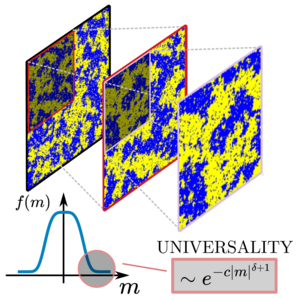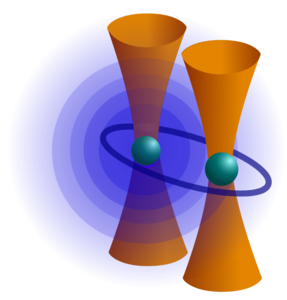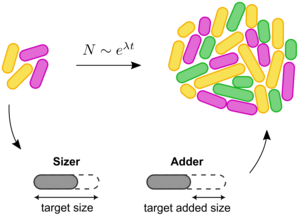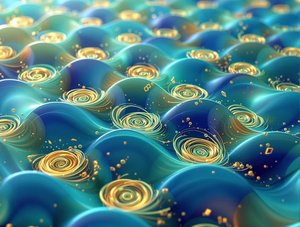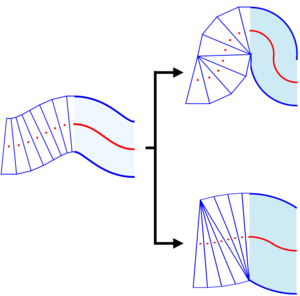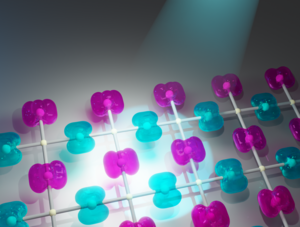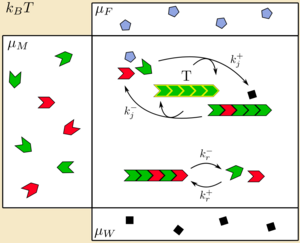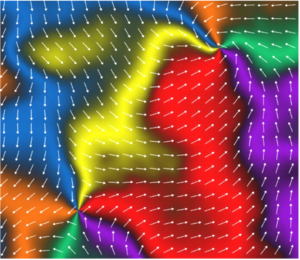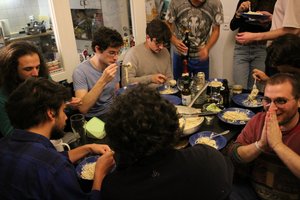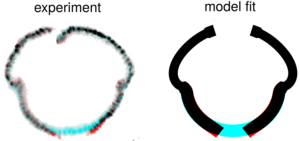
Highlights
Publication Highlights
Where does Universality hide?
The central limit theorem is one of the most important achievements in statistics and probability theory. It ensures that for many systems found in nature, the features observed (be they heights, dice rolls, or test scores) are always "normal", meaning that they follow a Gaussian distribution. However, when all the elements of the system interact and influence each other, this fundamental theorem can be broken and lead to uncontrolled dramatic behaviours. Explaining these remained a key open problem in statistical mechanics.
Now, Gianluca Teza of the Max Planck Institute for the Physics of Complex Systems and Attilio Stella of the University of Padova have built a unifying picture to close this gap. They have shown how the breakdown of the central limit theorem leads to specific universal and non-universal features that they found to be determined solely by extremely rare events that would never be observed in non-interacting systems. The validity of these findings was proved with exact analytical calculations in two paradigmatic models. Their results thus confirm and extend long-standing conjectures in statistical mechanics, while opening a series of applications ranging from computational physics to condensed matter.
Gianluca Teza and Attilio L. Stella, Phys. Rev. Lett. 134, 127102 (2025)
weiterlesenNow, Gianluca Teza of the Max Planck Institute for the Physics of Complex Systems and Attilio Stella of the University of Padova have built a unifying picture to close this gap. They have shown how the breakdown of the central limit theorem leads to specific universal and non-universal features that they found to be determined solely by extremely rare events that would never be observed in non-interacting systems. The validity of these findings was proved with exact analytical calculations in two paradigmatic models. Their results thus confirm and extend long-standing conjectures in statistical mechanics, while opening a series of applications ranging from computational physics to condensed matter.
Gianluca Teza and Attilio L. Stella, Phys. Rev. Lett. 134, 127102 (2025)
Publication Highlights
Giant molecules assembled atom-by-atom
Optical tweezers allow researchers to trap and manipulate atoms in laser beams, a technology at the core of quantum simulation and computing using ultracold atoms. Individual tweezers cannot be brought closer together than a few hundred nanometres. This distance is thousands of times bigger than a typical chemical bond, dooming the atoms to a lonely existence. However, when one of the atoms is promoted to a highly excited Rydberg state, its valence electron orbits far from the nucleus, even passing by a second atom held in a distant tweezer. This could allow exotic long-range molecules to form, bound by the attractive interatomic interaction mediated by the scattering of the electron off of the ground-state atom.
Now, Aileen Durst and Matthew Eiles of the Max Planck Institute for the Physics of Complex Systems and their collaborators at Durham University have made this idea a reality. The experimentalists at Durham University begin with isolated rubidium and caesium atoms in separate traps. After exciting the rubidium atom to a Rydberg state, they image the atoms to observe the molecular formation. By selecting spatially anisotropic Rydberg states and varying the tweezer separation, they confirm the theoretical predictions for the vibrational energies, alignment, and chemical bond length of the molecule made by the researchers at the Max Planck Institute for the Physics of Complex Systems. In the future, these capabilities may be applied to quantum simulators and computers that harness atoms excited to Rydberg states, and can be used to assemble molecules “on demand" from their individual components.
Alexander Guttridge, Tom R. Hepworth, Daniel K. Ruttley, Aileen A. T. Durst, Matthew T. Eiles, and Simon L. Cornish, Phys. Rev. Lett. 134, 133401 (2025)
weiterlesenNow, Aileen Durst and Matthew Eiles of the Max Planck Institute for the Physics of Complex Systems and their collaborators at Durham University have made this idea a reality. The experimentalists at Durham University begin with isolated rubidium and caesium atoms in separate traps. After exciting the rubidium atom to a Rydberg state, they image the atoms to observe the molecular formation. By selecting spatially anisotropic Rydberg states and varying the tweezer separation, they confirm the theoretical predictions for the vibrational energies, alignment, and chemical bond length of the molecule made by the researchers at the Max Planck Institute for the Physics of Complex Systems. In the future, these capabilities may be applied to quantum simulators and computers that harness atoms excited to Rydberg states, and can be used to assemble molecules “on demand" from their individual components.
Alexander Guttridge, Tom R. Hepworth, Daniel K. Ruttley, Aileen A. T. Durst, Matthew T. Eiles, and Simon L. Cornish, Phys. Rev. Lett. 134, 133401 (2025)
Publication Highlights
From noisy cell size control to population growth
Single-cell experiments have revealed substantial variability in generation times, growth rates, but also in birth and division sizes between genetically identical cells. Understanding how these fluctuations determine the fitness of the population, i.e., its long-term growth rate, is necessary in any quantitative theory of evolution.
Now, Arthur Genthon of the Max Planck Institute for the Physics of Complex Systems has developed a biologically relevant model which accounts for the stochasticity in single-cell growth rates, birth sizes, and division sizes. This model allows for expressions for the population growth rate and mean birth size in the population to be derived in terms of single-cell fluctuations. Allowing division sizes to fluctuate reveals how the mechanism of cell size control ("timer", "sizer", or "adder") influences population growth. Arthur Genthon finds that, surprisingly, fluctuations in single-cell growth rates can be beneficial for population growth when slow-growing cells tend to divide at smaller sizes than fast-growing cells.
Arthur Genthon, Phys. Rev. E 111, 034407 (2025), highlighted as an Editors' Suggestion
weiterlesenNow, Arthur Genthon of the Max Planck Institute for the Physics of Complex Systems has developed a biologically relevant model which accounts for the stochasticity in single-cell growth rates, birth sizes, and division sizes. This model allows for expressions for the population growth rate and mean birth size in the population to be derived in terms of single-cell fluctuations. Allowing division sizes to fluctuate reveals how the mechanism of cell size control ("timer", "sizer", or "adder") influences population growth. Arthur Genthon finds that, surprisingly, fluctuations in single-cell growth rates can be beneficial for population growth when slow-growing cells tend to divide at smaller sizes than fast-growing cells.
Arthur Genthon, Phys. Rev. E 111, 034407 (2025), highlighted as an Editors' Suggestion
Publication Highlights
Fragmented superconductivity in the Hubbard model as solitons in Ginzburg–Landau theory
High-temperature superconductivity, the phenomenon allowing current to flow without resistance in materials near room temperature, is one of the most captivating problems of modern condensed matter physics due to its potentially groundbreaking technological implications. Nevertheless, both its experimental realization and theoretical description have proven to be extraordinarily challenging. Recent experimental and numerical studies have revealed that the interplay between strong electron interactions and geometric frustration can induce superconductivity in 2D models, typically intertwined with a wave pattern in the electronic density.
Now Hannes Karlsson and Alex Wietek of the Max Planck Institute of the Physics of Complex Systems, together with collaborators at the Barcelona Institute of Science and Technology and at the Flatiron Institute, have delved into the properties of this intertwined state, demonstrating by large-scale numerical simulations that in the presence of charge density modulations, superconductivity is characterized by the condensation of electron pairs into a superposition of several macroscopic wavefunctions. This leads to the formation of a "fragmented" condensate, both in the presence and absence of a background magnetic flux. The researchers have also illustrated how a simple analytical model, requiring remarkably few experimentally measurable parameters, can accurately describe the behavior of the superconducting wavefunctions obtained in their numerical experiments. Their approach thus provides a readily applicable tool for fitting experimental results to analytical predictions in the quest for superconductivity in strongly-correlated materials.
Niccolò Baldelli, Hannes Karlsson, Benedikt Kloss, Matthew Fishman, and Alexander Wietek, npj Quantum Materials 10, 22 (2025)
weiterlesenNow Hannes Karlsson and Alex Wietek of the Max Planck Institute of the Physics of Complex Systems, together with collaborators at the Barcelona Institute of Science and Technology and at the Flatiron Institute, have delved into the properties of this intertwined state, demonstrating by large-scale numerical simulations that in the presence of charge density modulations, superconductivity is characterized by the condensation of electron pairs into a superposition of several macroscopic wavefunctions. This leads to the formation of a "fragmented" condensate, both in the presence and absence of a background magnetic flux. The researchers have also illustrated how a simple analytical model, requiring remarkably few experimentally measurable parameters, can accurately describe the behavior of the superconducting wavefunctions obtained in their numerical experiments. Their approach thus provides a readily applicable tool for fitting experimental results to analytical predictions in the quest for superconductivity in strongly-correlated materials.
Niccolò Baldelli, Hannes Karlsson, Benedikt Kloss, Matthew Fishman, and Alexander Wietek, npj Quantum Materials 10, 22 (2025)
Publication Highlights
Unbuckling mechanics of epithelial monolayers under compression
Many of the wrinkly shapes that appear throughout development, including the gyrations of the brain and the villi of the gut, arise from mechanical instabilities. These mechanical instabilities of tissues consisting of individual cells can be very different, however, from classical instabilities such as the buckling of a sheet of paper under compression.
Now Chandraniva Guha Ray and Pierre Haas of the Max Planck Institute for the Physics of Complex Systems and the Max Planck Institute of Molecular Cell Biology and Genetics have discovered curious "unbuckling" behaviour in a minimal mechanical model of an epithelial monolayer under compression. Unlike a sheet of paper, the buckling amplitude of which increases with increasing compression, and at sufficiently large compression, the buckling amplitude of this cell sheet can decrease with increasing compression. The authors explained how this unbuckling is associated with a bifurcation that occurs when all cells constrict to triangular shapes. Their calculation reveals how this results in a huge stiffening of the cell sheet to further compression. This provides a mechanism for the absorption of compressive stresses by tissue folds such as the cephalic furrow in the fruit fly Drosophila.
Chandraniva Guha Ray and Pierre A. Haas, Phys. Rev. Lett. 134, 118402 (2025), highlighted as an Editors' Suggestion
weiterlesenNow Chandraniva Guha Ray and Pierre Haas of the Max Planck Institute for the Physics of Complex Systems and the Max Planck Institute of Molecular Cell Biology and Genetics have discovered curious "unbuckling" behaviour in a minimal mechanical model of an epithelial monolayer under compression. Unlike a sheet of paper, the buckling amplitude of which increases with increasing compression, and at sufficiently large compression, the buckling amplitude of this cell sheet can decrease with increasing compression. The authors explained how this unbuckling is associated with a bifurcation that occurs when all cells constrict to triangular shapes. Their calculation reveals how this results in a huge stiffening of the cell sheet to further compression. This provides a mechanism for the absorption of compressive stresses by tissue folds such as the cephalic furrow in the fruit fly Drosophila.
Chandraniva Guha Ray and Pierre A. Haas, Phys. Rev. Lett. 134, 118402 (2025), highlighted as an Editors' Suggestion
Publication Highlights
Altermagnetism recognised among "Top 10 Breakthroughs of 2024"
The discovery of altermagnetism has been included by Science Magazine in the list of the "top science breakthroughs of 2024". This discovery is the only entry from the field of physics on the prestigious list, which is led by advances in HIV medicine and also includes the landing of a space rocket.
Altermagnetism was proposed a couple of years ago in a series of articles by Libor Šmejkal, now a group leader at the Max Planck Institute for the Physics of Complex Systems and the Max Planck Institute for the Chemical Physics of Solids, and colleagues from Prague and Mainz. Their initial prediction in 2018 of an unconventional anomalous Hall effect and a complex compensated spin density in direct and momentum space electronic structures paved the way for their systematic spin-symmetry classification in 2021. This classification uncovered altermagnets as a new class of magnets. In altermagnets (example shown in the image), not only the spin polarisation but also the spatial orientation of the adjacent magnetic atoms alternates.
In 2024, researchers published experimental observations of altermagnetism in MnTe and CrSb using momentum-space photoemission spectroscopy at large synchrotron facilities. These experiments were guided by the theoretical work of Libor Šmejkal and his collaborators.
Further reading:
L. Šmejkal et al., Science Adv. 6, 23 (2020)
I. I. Mazin et al., PNAS 118, 42 (2021)
L. Šmejkal, J. Sinova, and T. Jungwirth, Phys. Rev. X 12, 031042 (2022)
J. Krempaský, L. Šmejkal, S. W. D'Souza, et al., Nature 626, 517 (2024)
S. Reimers et al., Nat. Commun. 15, 2116 (2024)
weiterlesenAltermagnetism was proposed a couple of years ago in a series of articles by Libor Šmejkal, now a group leader at the Max Planck Institute for the Physics of Complex Systems and the Max Planck Institute for the Chemical Physics of Solids, and colleagues from Prague and Mainz. Their initial prediction in 2018 of an unconventional anomalous Hall effect and a complex compensated spin density in direct and momentum space electronic structures paved the way for their systematic spin-symmetry classification in 2021. This classification uncovered altermagnets as a new class of magnets. In altermagnets (example shown in the image), not only the spin polarisation but also the spatial orientation of the adjacent magnetic atoms alternates.
In 2024, researchers published experimental observations of altermagnetism in MnTe and CrSb using momentum-space photoemission spectroscopy at large synchrotron facilities. These experiments were guided by the theoretical work of Libor Šmejkal and his collaborators.
Further reading:
L. Šmejkal et al., Science Adv. 6, 23 (2020)
I. I. Mazin et al., PNAS 118, 42 (2021)
L. Šmejkal, J. Sinova, and T. Jungwirth, Phys. Rev. X 12, 031042 (2022)
J. Krempaský, L. Šmejkal, S. W. D'Souza, et al., Nature 626, 517 (2024)
S. Reimers et al., Nat. Commun. 15, 2116 (2024)
Publication Highlights
Nonequilibrium Transitions in a Template Copying Ensemble
The ability to replicate is a hallmark of the living world. Organisms can replicate themselves as well as cells, and DNA replication, RNA transcription, and RNA translation to proteins are examples of polymer template copying. Generating a DNA polymer copy with near-identical sequence to the template DNA requires energy consumption which drives the system out-of-equilibrium and generates dissipation.
Now, Arthur Genthon and Frank Jülicher of the Max Planck Institute for the Physics of Complex Systems, and Carl Modes and Stephan Grill of the Max Planck Institute of Molecular Cell Biology and Genetics have proposed a statistical physics framework to investigate the conditions necessary for accurate replication. This framework is thermodynamically consistent, as it includes both the fuel-driven templated copy process and a spontaneous assembly process and also their time-reversed pathways. Furthermore, the authors focused on universal features of copying by considering one-step processes in which molecular details are coarse-grained.
This minimal setting allows for the identification of a regime of accurate copying, and led to the discovery of a sharp nonequilibrium transition between regimes of accurate and inaccurate copying. This transition occurs at a threshold fuel drive, which indicates the thermodynamic cost of accuracy.
A. Genthon et al., Phys. Rev. Lett. 134, 068402 (2025)
weiterlesenA. Genthon et al., Phys. Rev. Lett. 134, 068402 (2025)
Publication Highlights
Nanoscale mapping of altermagnetism
An international team of researchers, including Libor Šmejkal of the Max Planck Institute for the Physics of Complex Systems and the Max Planck Institute for the Chemical Physics of Solids has revealed nanoscale mapping of altermagnetism. The experimental work was led by researchers from Nottingham, who successfully mapped altermagnetic domains in Manganese Telluride. They also demonstrated control of these domains through nanopatterning and the application of magnetic fields.
The experimental mapping of the direction of altermagnetic domains was made possible using x-ray magnetic circular dichroism, i.e., an absorption sensitivity to left- and right-circularly polarized light. Observing x-ray magnetic circular dichroism in altermagnets also serves as confirmation of the unconventional time-reversal symmetry-breaking electronic structure proposed several years ago. The experiment was designed based on earlier predictions by Libor Šmejkal.
The demonstration of large micrometer-sized domains and their manipulation marks an important step toward bringing altermagnets closer to applications in ultrafast, energy-efficient spintronics and nanoelectronics.
O. J. Amin, A. Dal Din et al., Nature 636, 348 (2024)
L. Šmejkal et al., Science Adv. 6, 23 (2020)
weiterlesenThe experimental mapping of the direction of altermagnetic domains was made possible using x-ray magnetic circular dichroism, i.e., an absorption sensitivity to left- and right-circularly polarized light. Observing x-ray magnetic circular dichroism in altermagnets also serves as confirmation of the unconventional time-reversal symmetry-breaking electronic structure proposed several years ago. The experiment was designed based on earlier predictions by Libor Šmejkal.
The demonstration of large micrometer-sized domains and their manipulation marks an important step toward bringing altermagnets closer to applications in ultrafast, energy-efficient spintronics and nanoelectronics.
O. J. Amin, A. Dal Din et al., Nature 636, 348 (2024)
L. Šmejkal et al., Science Adv. 6, 23 (2020)
Publication Highlights
The Physics of "Cacio e pepe" sauce
"Cacio e pepe" is a traditional recipe from Rome. It consists of tonnarelli noodles served with a cream of cheese, starch-enriched water, and pepper. Despite its simplicity, it is hard to avoid cheese clumps which make the sauce unpleasant. Interestingly, omitting starch leads to huge clumps (the dreaded "mozzarella phase").
Now, in a preprint highlighted by international news outlets including the New York Times, eight Italian physicists, currently or formerly researchers at the Max Planck Institute for the Physics of Complex Systems, have tackled this crucial problem. Using a homemade experimental apparatus, cheese from Italy, and a bit of data analysis, they produced a phase diagram of "cacio e pepe" sauce by varying temperature and starch content systematically and by characterising the "quality" of the sauce by measuring clump sizes. They found that, above a certain threshold, huge mozzarella-like clumps give way to smaller cheese clusters. They have also modelled their observations in terms of a lower critical solution temperature by introducing a minimal theoretical model that frames the observed phase diagram.
See also the article related to this work in the New York Times.
Giacomo Bartolucci, Daniel M. Busiello, Matteo Ciarchi, Alberto Corticelli, Ivan Di Terlizzi, Fabrizio Olmeda, Davide Revignas, and Vincenzo M. Schimmenti, arXiv:2501.00536 (2025)
weiterlesenNow, in a preprint highlighted by international news outlets including the New York Times, eight Italian physicists, currently or formerly researchers at the Max Planck Institute for the Physics of Complex Systems, have tackled this crucial problem. Using a homemade experimental apparatus, cheese from Italy, and a bit of data analysis, they produced a phase diagram of "cacio e pepe" sauce by varying temperature and starch content systematically and by characterising the "quality" of the sauce by measuring clump sizes. They found that, above a certain threshold, huge mozzarella-like clumps give way to smaller cheese clusters. They have also modelled their observations in terms of a lower critical solution temperature by introducing a minimal theoretical model that frames the observed phase diagram.
See also the article related to this work in the New York Times.
Giacomo Bartolucci, Daniel M. Busiello, Matteo Ciarchi, Alberto Corticelli, Ivan Di Terlizzi, Fabrizio Olmeda, Davide Revignas, and Vincenzo M. Schimmenti, arXiv:2501.00536 (2025)
Publication Highlights
Cutting through the stresses in cell sheet folding
During development, tissues fold into the functional shapes of organs and organisms. This morphogenesis is driven by a complex interplay of mechanical forces and molecular signalling. While the latter can be visualized by fluorescent tagging, inferring mechanical forces has remained one of the key challenges of biological mechanics. This is especially tricky in curved cell sheets in which these forces have components out of the tissue plane.
Now, Pierre Haas of the Max Planck Institute for the Physics of Complex Systems and Steph Höhn of the University of Cambridge have shown how to combine a mechanical model and laser ablation experiments to infer these forces from the recoil of a cell sheet on ablation, using the process of inversion of the green alga Volvox as a model system. Bending of cell sheets is often driven by what is called cell wedging (constriction of one side of the cells to splay them and hence bend the cell sheet), but this analysis revealed out-of-plane stresses away from those regions where cell wedging bends the tissue of Volvox. In this way, the researchers provide not only an experimental and theoretical framework to quantify out-of-plane stresses during development, but also show how additional cell shape changes can complement classical cell wedging to drive cell sheet folding.
Pierre A. Haas and Steph S. M. H. Höhn, Phys. Rev. E 111, 014420 (2025), highlighted as an Editors' Suggestion
weiterlesenNow, Pierre Haas of the Max Planck Institute for the Physics of Complex Systems and Steph Höhn of the University of Cambridge have shown how to combine a mechanical model and laser ablation experiments to infer these forces from the recoil of a cell sheet on ablation, using the process of inversion of the green alga Volvox as a model system. Bending of cell sheets is often driven by what is called cell wedging (constriction of one side of the cells to splay them and hence bend the cell sheet), but this analysis revealed out-of-plane stresses away from those regions where cell wedging bends the tissue of Volvox. In this way, the researchers provide not only an experimental and theoretical framework to quantify out-of-plane stresses during development, but also show how additional cell shape changes can complement classical cell wedging to drive cell sheet folding.
Pierre A. Haas and Steph S. M. H. Höhn, Phys. Rev. E 111, 014420 (2025), highlighted as an Editors' Suggestion

